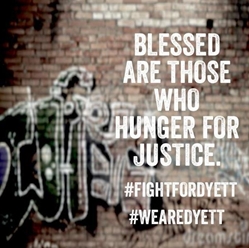A couple of weeks ago, while watching a Saints game outside a local New Orleans’ barroom, I met Prudence Brown, one of the Dyett 12. The Dyett 12 are a group of Chicagoans who have taken to a hunger strike to save their neighborhood high school, named for Walter Henri Dyett. Dyett was an African American violinist and music instructor in Chicago, whose students included Nat King Cole, Dinah Washington, Bo Diddley and many others.
What struck me most about Prudence’s story is that she is participating in the place of a community elder, whose health probably would not have lasted as long. Because, as Chicago Tribune columnist, Eric Zorn notes in his piece When to Pay Attention to Hunger Strikers, “A hunger strike is a suicide threat in slow motion.” And while I am greatly appreciative for Mr. Zorn helping us to understand what a hunger strike is, it is his final sentence that truly helps to clarify confusion on this and so many other actions taken by the Black community this year. “Would today’s protesters rather die than live in a world without the Dyett Global Leadership and Green Technology Community High School, the academy they want CPS to establish?”
In that single sentence, Mr. Zorn echoes the thoughts of those who said the rioters in Baltimore and Ferguson, in response to police violence against Black communities, were not fighting for Freddie Gray or Michael Brown because the families called for peace. The problem with this line of thinking is that while Dyett H.S., Freddie Gray, or Michael Brown may be the catalysts, the issue is a much larger, more systemic one; that in a country that promises life, liberty, and the pursuit of happiness as inalienable rights, a country that proudly boasts that all men are created equal, Black lives don’t matter.
Education, at its core, serves to preserve and advance our cultural mores and values. It is for this reason that a school like Dyett becomes such a compelling focal point for the hunger strike. It’s located in Bronzeville, an historically Black community that was once hailed as a national center of urban African-American commerce and art, and named for a Black music instructor who helped to produce some of America’s most notable musical icons. The Dyett 12 are not hunger striking for a school, but for the right of their community to self-determine the mores and values that will give their children the greatest opportunities to achieve the aforementioned life, liberty, and pursuit of happiness; as expressed in both the name of the school and the history of the community.
Folks often say, in an offhand manner, that they will die for their kids. The Dyett 12 are in fact (according to the hip hop lexicon) showing and proving that they are willing to die for the future of Bronzeville youth. In these times of #blacklivesmatter, protests against police violence against Black communities, food deserts, and the plethora of environmental injustices plaguing Black and low-income communities, we should each look deep within ourselves, inspired by Prudence and the Dyett 12, and ask just what am I doing to promote justice in these United States.

